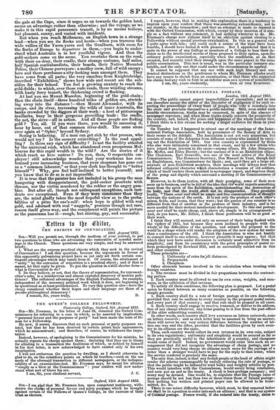Oxford, 12th August 1852.
Sin—I am glad that Mr. Freeman has, upon competent testimony, with- drawn the charge of personal favour and party purposes which he brought against certain of the Fellows of Queen's College, in the exercise of their
trust u electors.
I regret, however, that in making this explanation there is a tendency to impress upon your readers that there was something extraordinary, not to say sinister, in the transaction ; and that an attempt is made to connect it with the Oxford Commission, with which, except by their mention of it sim- ply as a fact without any comment, it had nothing whatever to do. Mr. Freeman's charge now reduces itself to an objection against electing to a Fellowship without special previous examination. In this as a general rule I quite agree with him ; and could such a course at the time have been feasible, I should have hailed it with pleasure. But I apprehend that it is quite in the power of any College or members of a College to base their de- cision as to the intellectual merits of those proposed to their option, upon the ordinary public examination, especially when the candidates, as on that occasion, had recently tried their strength upon the same papers in the same public examination. This test is usual, was in the particular instance sta- tutable, and the only one that could under the circumstances be applied.
It cannot be supposed that any one with such high literary and aca- demical distinctions as the gentleman to whom Mr. Freeman alludes could have any reason to shrink from an examination, or that those who supported his claims had any wish to foist in an inferior man on a system of nomination.


























 Previous page
Previous page